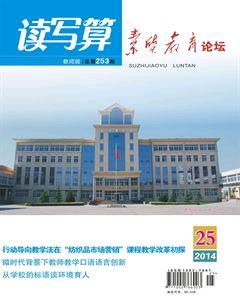浅淡初中英语限制性定语从句教学
黄丽红
定语从句分为限制性定语从句和非限制性定语从句两种。限制性定语是句中不可缺少的组成部分,如果缺少,先行词的意思就不明确,主句也不完整。这类句子和主句之间一般不用逗号分开。限制性定语从句中的关系代词有时可以省略。非限制性定语从句是对主句是先行词的补充说明,没有从句并不影响主句意思的明确或完整。这类从句一般用逗号与主句分开。非限制性定语从句中的关系代词不可省略。
一、定义
在复合句中担任定语的从句,叫定语从句。定语从句通常置于它所修饰的名词或代词以后,这种名词或代词叫做先行词。
二、引导定语从句的关联词
⒈关系代词:that,which,who,whom和whose
⒉关系副词:where,when和why
关系代词与关系副词在句中起联系从句与主句的作用,同时又在从句中作一定的成分。如主语、宾语、定语、状语等。
三、关系代词:that,who(whom)whose和which的具体用法
(1)that引导的定语从句。在从句中作主语、宾语等。其先行词是人也可以是物。
①A scientist is a person who/that invents or discovers things.(主语)
②A train is a machine that can run..(主语)
③He is the man that/whom we should learn from.(宾语)
(2)Who(whom)引导的定语从句。在从句中作主语、宾语等。其先行词是人。(若在从句中作宾语,要用whom)。
①The teacher who/that teaches us English is from the USA.(主语)
②She is the person whom/that I met at the school gate yesterday.(宾语)
(3)Which引导的定语从句。在从句中作主语或宾语。其先行词是物。
The letter which/that he received yesterday is his mothers(宾语)
(4)Whose指人或物。在从句中作定语。指物时常可用of which代替。
①The man whose bike was stolen was my uncle.(指人作定语)
②Mr Green lives in a house whose roof is red.(指物作定语)
四、注意以下几点
1.用that而不用which的情况
(1)先行词为all,much,little,everything,anything,nothing,none,few,the one等不定代词时。
①Thats all that I have seen and heard.
②I mean the one that was bought yesterday.
(2)指物的先行词被形容词最高级或被only,any,one of,few等修饰时。
①It is the most important task that should be finished soon.
②My necklace is not the only thing that is missing.
(3)先行词为数词或被序数词(含last)修饰时:
Look at there flowers.You can see the two that you gave me.
(4)先行词中既有人又有物时:
we were deeply impressed by the teachers and schools that we had visited.
2.不用that的情况
(1)当先行词本身是that时,关系代词要用which.
The clock is that which tells the time.
(2)关系代词前有介词时:
Eg:This is the room in which Lu Xun lived.
3.关系代词在从句中作宾语时可省
①The tool(that/which)he is working with is called a saw.
②Do you know the woman(who/that)she was talking to?
4.当关系代词在定语从句中作主语时,定语从句中的谓语动词在人称和数上与先行词保持一致
①The child who is reading there is my brother.
②The children who are reading are my classmates.
五、关系副词when,where,why的用法
关系副词在定语从句中只能充当从句的状语,不能省略。
1.when引导的定语从句
when在定语从句中作表示时间的状语。它所修饰的是表示“时间”的词。
①I still remember the day when you first came here.
②The day when we won the match finally came.
2.where引导的定语从句
where在定语从句中作地点状语,修饰的先行词是表示“地点”的名词或代词。
①I like the places where it is warm.
②Do you still remember the village where you were born?
3.why引导的定语从句
why在定语从句中作原因状语,修饰的先行词一般是reason.
①The reason why he was late was that he missed the bus.
②I dont know the reason why he is crying.endprint

